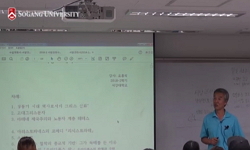에크하르트 사상에는 이중적 의미가 담긴 개념들이 있다. 신과 인간의 합일의 길을 규명하고자 한 그의 신비주의 철학의 핵심 개념들 중에 ‘버리고 떠나 있음’(Abgeschiedenheit), ‘무’(Nichts)...
http://chineseinput.net/에서 pinyin(병음)방식으로 중국어를 변환할 수 있습니다.
변환된 중국어를 복사하여 사용하시면 됩니다.
- 中文 을 입력하시려면 zhongwen을 입력하시고 space를누르시면됩니다.
- 北京 을 입력하시려면 beijing을 입력하시고 space를 누르시면 됩니다.
https://www.riss.kr/link?id=A107763785
- 저자
- 발행기관
- 학술지명
- 권호사항
-
발행연도
2021
-
작성언어
Korean
-
주제어
버리고 떠나 있음 ; 무 ; 지성 ; 이중성 ; 상태와 과정 ; 신비적 합일 ; 영혼의 근저 ; 신의 탄생 ; Detachment ; Nothing ; Intellect ; Duplicity ; State and Process ; Mystical Union ; Ground of Soul ; Birth of God
-
등재정보
KCI등재
-
자료형태
학술저널
-
수록면
115-152(38쪽)
-
KCI 피인용횟수
0
- DOI식별코드
- 제공처
- 소장기관
-
0
상세조회 -
0
다운로드
부가정보
국문 초록 (Abstract)
에크하르트 사상에는 이중적 의미가 담긴 개념들이 있다. 신과 인간의 합일의 길을 규명하고자 한 그의 신비주의 철학의 핵심 개념들 중에 ‘버리고 떠나 있음’(Abgeschiedenheit), ‘무’(Nichts) 그리고 ‘지성’(Intellectus, Vernunft)이 신과 인간에게 공통으로 적용되어 이중적 의미를 띠고 있는 것이다.
이 개념들의 이중성은 에크하르트가 ‘신과 인간의 신비적 합일’(unio mystica)을 설명하기 위한 수단으로 사용하여, 신비적 합일을 이룰 수 있는 그 가능성의 ‘상태’(Zustand)와 그 상태적 측면이 어떤 작용과 활동으로 합일의 사건에 연관되는지 ‘과정’(Prozess)으로서 드러난다. 그러나 이러한 이중성은 신과 인간의 아무런 구분이 없는 온전한 하나 됨의 사건, 곧 ‘영혼의 근저(Seelengrund)에서의 신의 탄생’으로 해체된다. 곧 신과 인간이라는 관점에서 비롯된 상태와 과정 그리고 그 수동성과 능동성이라는 이중적 의미는 신비적 합일의 목적이 성취된 거기(근저)에서 사라지는 것이다. 이는 종말론적 결론이 아니라 영원한 현재에서 생기하는 사건이다.
에크하르트의 신비주의 철학적 개념들을 해석하는 데 어려움을 겪는 이유이기도 한 이러한 ‘이중성’은, 순수성과 절대성 그리고 초월성 등으로 표현할 수 있는 신의 본성으로서의 상태적 측면이 어떤 작용과 활동으로 신비적 합일을 이루는 과정에 상호 연관성으로 나타나는지 보여주고 있는 바, 그 변증법적 통일성을 찾아가는 것이 본고의 목적이다.
신비주의 철학적 개념의 특성에서 비롯된 유비적인 표현이나 한편으로 대립적이며 모순적으로 보이는 언명들이 가리키는 본래의 의미와 그 의미가 지향하는 점에 대해 숙고하다 보면, 에크하르트의 개념들이 가진 이중성에서 벗어나고 떠나게 됨으로써 결국 반성적 작업조차 돌파되어 만나는 장중한 귀결에 이르게 될 것이다. 그것은 신이 아니면 아무것도 아닌 무로서의 피조물인 인간이 온전히 신이 되는 가슴 벅찬 완전성의 실현, 지복직관의 가능성을 에크하르트를 통해 선물로 받게 되는 감격이다.
다국어 초록 (Multilingual Abstract)
The thoughts of Meister Eckhart who had investigated the unity of God and man has several mystic concepts including double meaning. Those are ‘Detachment’(Abgeschiedenheit), ‘Nothing’(Nichts), and ‘Intellect’ (Intellectus) among the key co...
The thoughts of Meister Eckhart who had investigated the unity of God and man has several mystic concepts including double meaning. Those are ‘Detachment’(Abgeschiedenheit), ‘Nothing’(Nichts), and ‘Intellect’ (Intellectus) among the key concepts concerning his mysticism which understood double meaning applied to God and man in common.
The duplicity in these concepts has been used as Eckhart’s method in order to explain his fundamental theory of ‘Unio Mystica’. This represents as a ‘process’(Prozess) on mutual work and activity concerning that issue which could be united to the ‘state’(Zustand) of possibility for the unity of two subjects. However, this duplicity has been disintegrated to ‘the birth of God in the Ground of the Soul’ that means the complete union between God and man’s boundless relation. The double meaning of God, the human, the state, the process, the passivity and the activity disappears when he discovered the united point that accomplished the Unio Mystica. This is not an apocalyptic conclusion but an incident that happend in the eternal presence.
This duplicity which represents the reason why it has been difficult in interpreting Eckart"s mystical philosophical concepts is the nature of God by his existence such as Purity, Absoulteness, Transcendence. These manifest the results of the state from God’s nature how it unfolded the mutual interconnection on the process of Unio Mystica. This is the main purpose of my research in searching for dialectical unity.
Once duplicity could be concerned as the original meaning and the goal of that meaning it will reach the grave conclusion, as it departs from the duality of Eckhart’s concepts, then they could encounter each other beyond reflective work. This realization of completeness leads to the possibility of the beatific vision by Eckhart which means unification with God as a human creature who means nothing without God becoming God.
목차 (Table of Contents)
- 국문 초록
- Ⅰ. 들어가는 말
- Ⅱ. 버리고 떠나 있음(Abgeschiedenheit)
- Ⅲ. 무(Nichts, 無)
- Ⅳ. 지성(Intellectus)
- 국문 초록
- Ⅰ. 들어가는 말
- Ⅱ. 버리고 떠나 있음(Abgeschiedenheit)
- Ⅲ. 무(Nichts, 無)
- Ⅳ. 지성(Intellectus)
- Ⅴ. 영혼의 근저에서의 신의 아들의 탄생
- Ⅵ. 나가는 말
- 참고문헌
- Abstract
참고문헌 (Reference)
1 엘더스, 레오, "토마스 아퀴나스의 형이상학" 가톨릭출판사 2003
2 정달용, "중세 독일 신비사상" 분도출판사 2007
3 셸링, F.W.J, "자연철학의 이념" 서광사 1999
4 이부현, "에크하르트의 영혼의 근저에서 신의 탄생" 신학연구소 (180) : 74-105, 2013
5 유대칠, "에크하르트와 후기 중세 철학" 한국가톨릭철학회 (11) : 247-276, 2008
6 박홍기, "에크하르트 설교 71에 나타난 무(無)의 의미" 신학연구소 (180) : 106-139, 2013
7 이부현, "에크하르트 사상을 체계화시킬 수 있을까?" 신학연구소 (208) : 97-131, 2020
8 이부현, "에크하르트 『파리 질문집 Ⅰ』에 대한 하나의 해석: 신은 존재가 아니라 지성이다" 신학연구소 (184) : 67-113, 2014
9 김권일, "신비주의자 마이스터 에크하르트" 173 : 234-257, 2011
10 데이비스, 올리버, "신비신학자 마이스터 엑카르트" 분도출판사 2010
1 엘더스, 레오, "토마스 아퀴나스의 형이상학" 가톨릭출판사 2003
2 정달용, "중세 독일 신비사상" 분도출판사 2007
3 셸링, F.W.J, "자연철학의 이념" 서광사 1999
4 이부현, "에크하르트의 영혼의 근저에서 신의 탄생" 신학연구소 (180) : 74-105, 2013
5 유대칠, "에크하르트와 후기 중세 철학" 한국가톨릭철학회 (11) : 247-276, 2008
6 박홍기, "에크하르트 설교 71에 나타난 무(無)의 의미" 신학연구소 (180) : 106-139, 2013
7 이부현, "에크하르트 사상을 체계화시킬 수 있을까?" 신학연구소 (208) : 97-131, 2020
8 이부현, "에크하르트 『파리 질문집 Ⅰ』에 대한 하나의 해석: 신은 존재가 아니라 지성이다" 신학연구소 (184) : 67-113, 2014
9 김권일, "신비주의자 마이스터 에크하르트" 173 : 234-257, 2011
10 데이비스, 올리버, "신비신학자 마이스터 엑카르트" 분도출판사 2010
11 힐쉬베르거, 요한네스, "서양철학사 상권: 고대와 중세" 이문출판사 1999
12 길희성, "마이스터 엑카르트의 영성 사상" 분도출판사 2003
13 심종혁, "마이스터 에크하르트의 신비주의와 영성" 46 : 7-39, 2003
14 이부현, "마이스터 에크하르트의 독일어 설교들에 나타난 주요 주제: ‘버리고 떠나 있음’(Abgeschiedenheit)을 중심으로" 5 : 163-209, 1999
15 플라쉬, 쿠르트, "마이스터 에크하르트" 대구가톨릭대학교출판부 2016
16 Raviolo, Isabelle, "Zum Intellektverständnis von Meister Eckhart und Nikolaus von Kues" Aschendorff 93-106, 2012
17 Caputo, John D, "The Nothingness of the Intellect in Meister Eckhart’s ‘Parisian Questions’" 39 : 85-115, 1975
18 Haas, A.M, "Sermo mysticus: Studien zu Theologie und Sprache der deutschen Mystik" Universitäts 186-208, 1979
19 김형수, "Negatio negationis: 마이스터 에크하르트에서 존재, 부정, 통일성" 24 : 194-217, 2011
20 Kremer, K, "Meister Eckharts Stellungnahme zum Schöpfungsgedanken" 74 : 65-82, 1965
21 Flasch, K, "Meister Eckhart: Philosoph des Christentums" C. H. Beck 2010
22 Welte, Bernhard, "Meister Eckhart: Gedanken zu seinen Gedanken" Herder 1992
23 Jäger, Sigran, "Meister Eckhart: Ein Wort im Wort" Akademie 2008
24 Meister Eckhart, "Meister Eckhart: Deutsche Predigten und Traktate" Diogenes Verlag 1979
25 Meister Eckhart, "Meister Eckhart, Deutsche Predigten und Traktate" Diogenes 1979
26 Piesch, Herma, "Meister Eckhart der Prediger, Festschrift zum Eckhart- Gedenkjahr" Herder 167-199, 1960
27 Meister Eckhart, "Meister Eckhart Werke II" Deutscher Klassiker 1993
28 Ruh, Kurt, "Meister Eckhart Pariser Quaestionen 1-3 und eine deutsche Predigtsammlung" 10 : 307-325, 1984
29 Meister Eckhart, "Meister Eckhart Die deutschen Werke, Bd. V" W. Kohlhammer 1963
30 Meister Eckhart, "Meister Eckhart Die deutschen Werke, Bd. IV" W. Kohlhammer 2003
31 Meister Eckhart, "Meister Eckhart Die deutschen Werke, Bd. III" W. Kohlhammer 1976
32 Meister Eckhart, "Meister Eckhart Die deutschen Werke, Bd. II" W. Kohlhammer 1971
33 Meister Eckhart, "Meister Eckhart Die deutschen Werke, Bd. I" W. Kohlhammer 1958
34 "Meister Eckhart"
35 이부현, "M. 엑카르트의 인식론의 기본 개념" 한국가톨릭철학회 (13) : 177-199, 2009
36 Steer, G, "Lectura Eckhardi: Predigten Meister Eckharts von Fachgelehrten gelesen und gedeutet" W. Kohlhammer 1998
37 Steer, G, "Lectura Eckhardi II: Predigten Meister Eckharts von Fachgelehrten gelesen und gedeutet" W. Kohlhammer 2003
38 McGinn, Bernard, "Lectura Eckhardi II" W. Kohlhammer 205-232, 2003
39 Pfeiffer, F, "Jahrhunderts, Bd. II" Vandenhoeck & Ruprecht 1906
40 Ruh, Kurt, "Geschichte der abendländischen Mystik, Bd. I" C. H. Beck 1990
41 Enders, Markus, "Gelassenheit und Abgeschiedenheit: Studien zur Deutschen Mystik" Verlag Dr. Kovač 2008
42 Haas, A.M, "Geistliches Mittelalter" Universitäts 339-372, 1984
43 Manstetten, R, "Esse est Deus" Alber 1993
44 Meister Eckhart, "Die lateinischen Werke, Bd. V" W. Kohlhammer 2006
45 Meister Eckhart, "Die lateinischen Werke, Bd. IV" W. Kohlhammer 1987
46 Meister Eckhart, "Die lateinischen Werke, Bd. III" W. Kohlhammer 1936
47 Kern, Udo, "Die Anthropologie des Meister Eckhart" Verlag Dr. Kovač 1994
48 Reiter, Peter, "Der Seele Grund: Meister Eckhart und die Tradition der Seelenlehre" Königshausen und Neumann 1993
49 Meister Eckhart, "Auftrage der Deutschen Forschungsgemeinschaft" Kohlhammer 1986
50 Forman, Robert K.C, "An Experiment in Methodology" Element Books 1991
51 Enders, Markus, "Abgeschiedenheit des Geistes: höchste ‘Tugend’ des Menschen und fundamentale Seinsweise Gottes" 71 : 63-87, 1996
52 이상섭, "13, 4세기 도미니코회에서의 가능지성의 가능성 개념의 변화 -알베르투스부터 에크하르트까지-" 한국가톨릭철학회 (23) : 177-211, 2014
동일학술지(권/호) 다른 논문
-
- 광주가톨릭대학교 신학연구소
- 허규(Heo, Kyu)
- 2021
- KCI등재
-
참된 개혁, 그릇된 개혁: 콩가르의 『교회 내 참된 개혁, 그릇된 개혁』에 나타난 참된 개혁의 조건들에 대한 비판적 연구
- 광주가톨릭대학교 신학연구소
- 최현순(Choi, Hyeon Soon)
- 2021
- KCI등재
-
- 광주가톨릭대학교 신학연구소
- 권영파(Kwon, Youngpa)
- 2021
- KCI등재
-
내적 시간성에서 아우구스티누스의 마음과 사르트르의 의식에 대한 비교연구
- 광주가톨릭대학교 신학연구소
- 이창석(Lee, Chang Suk)
- 2021
- KCI등재
분석정보
인용정보 인용지수 설명보기
학술지 이력
| 연월일 | 이력구분 | 이력상세 | 등재구분 |
|---|---|---|---|
| 2022 | 평가예정 | 재인증평가 신청대상 (재인증) | |
| 2019-01-01 | 평가 | 등재학술지 유지 (계속평가) |  |
| 2016-01-01 | 평가 | 등재학술지 유지 (계속평가) |  |
| 2012-01-01 | 평가 | 등재학술지 선정 (등재후보2차) |  |
| 2011-01-01 | 평가 | 등재후보 1차 PASS (등재후보1차) |  |
| 2009-01-01 | 평가 | 등재후보학술지 선정 (신규평가) |  |
학술지 인용정보
| 기준연도 | WOS-KCI 통합IF(2년) | KCIF(2년) | KCIF(3년) |
|---|---|---|---|
| 2016 | 0.33 | 0.33 | 0.32 |
| KCIF(4년) | KCIF(5년) | 중심성지수(3년) | 즉시성지수 |
| 0.29 | 0.23 | 0.668 | 0.17 |





 DBpia
DBpia







